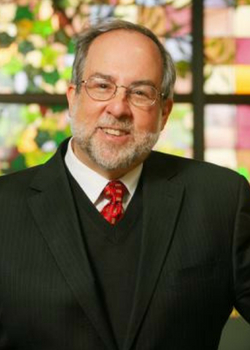He is our first forefather, the progenitor of the Covenant, and yet we do not call ourselves "Bnai Avraham", the children of Abraham. We invoke the memory of the Akeda when we beg God's forgiveness, but we do not call ourselves "Bnai Yitzchak", the children of Isaac. We are "Bnai Yisrael", the children of Israel, the descendants of Jacob. Jacob? Why Jacob? Of the three, Jacob is our least likely spiritual ancestor. He is manipulative, conniving, and entirely amoral. He exploits his brother's weakness to purloin his birthright. He uses his father's blindness to steal his blessing. Having succeeded in shattering the family, he attempts to twist the arm of God: "Jacob made a vow, saying: 'If God remains with me, if He protects me on this journey that I am making, and gives me bread to eat and clothing to wear, and if I return safe to my father's house -- the Lord shall be my God...I will set aside a tithe for You." (Genesis 28: 20-22) What sort of spiritual hero is this?
How poorly these Jacob stories compared with the epic heroes of other traditions. Elsewhere we read of the spiritual hero born of immaculate conception and living a life perfect and untouched by sin. His every word measured and every gesture considered, his life from beginning to end is a masterwork of moral wisdom. Or we read of a hero who begins mortal, even sinful, but through grace or will, finds his way to a state of perfect wisdom, perfect action, perfect peace, returning to our world only to bring others along the path toward perfection.
Jacob is a different kind of spiritual hero. He is not born whole or good. He is not born with a divine character. Nor does he ever achieve a perfection of character or spirit. Jacob is not a hero because of what he is. He is a hero because of what he is becoming. The Jacob narratives chronicle the growth of a soul, the development of a mensch. They portray a process of learning, of change, of struggle, of defeat and renewal, of death and rebirth. This dynamic is the power of the narrative. And in this process, the hand of God is revealed. Like his dream, Jacob's life is a "ladder, set on the ground, with its top reaching into the sky, and the angels of God going up and down on it."
Elsewhere, we read of heroes battling demons and dragons and devils in mythical lands, storming the heavens to steal the secrets of the cosmos. Again, Jacob is a different kind of hero. What is the setting of Jacob's struggle? A place far more dangerous: The family. Jacob will be hunted by his brother, deceived by his uncle, manipulated by his wives, and finally devastated by the murderous jealousy of his sons. In each encounter, Jacob will be defeated. But each defeat deepens him, bringing him closer to wholeness, to wisdom and opens him to love.
The Jacob narratives hold out the promise that any life, any soul, any character can be rescued, elevated, purified, ennobled, saved. These stories reflect a spirituality of journey. God is not found only at the journey's end, but in each step, especially the painful and fearful steps.
Spiritual perfection is not a quality one is born to, nor an awakening at the end of arduous meditation. Rather, each step has its own revelation. To open oneself to the love of a partner. To make peace with a brother. To mourn and then to rise and live again. God is present in each step, each choice, each moment. "Remember," God assures Jacob as he begins his journey, "I am with you: I will protect you wherever you go and will bring you back to this land. I will not leave you until I have done what I have promised you." (Genesis 28:15)
In all your suffering and struggle, God promises: Remember, I'm not finished with you.
Shabbat Shalom!

